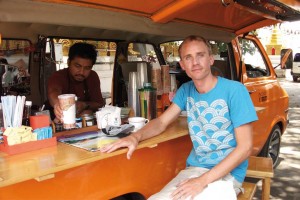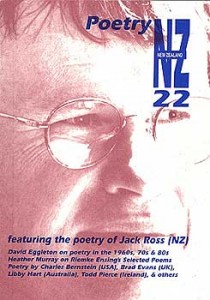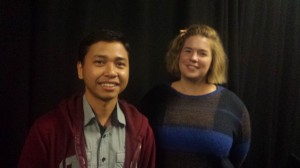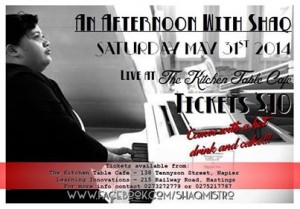When tweeting is more important than being there…
New technology is radically altering our experience of far-off lands, says a travelling social anthropologist from Massey University.
These days we can have one foot on the exotic land we are in, while the other is back home or in any number of other places, says Dr Chris Howard from Massey University’s Albany Campus.
Standing in front of an ancient monument we upload an instant image to Facebook, or on safari in Africa our concern is the tweet we are sending about the lions as much as actually seeing and experiencing them.
Many people these days, and especially young people, plan how they are going to share and document their experiences before they’ve even had them, says the 31-year-old who wrote his doctorate on the changing face of travel.
For his research, Dr Howard spent more than three months interviewing and observing travellers in Nepal and India.
Even these interviews were tricky because where not so long ago people socialised with each other in hostels and guesthouses, now they put on their headphones and gaze into the screen of their smartphone, iPad or laptop.
While five years ago the same people might have checked their email every few days at an internet café, now everything is instant.
Dr Howard describes the impact of mobile technology on travel as “inter-place” – a phenomenon where people can almost be in two places at once.
“These technologies allow us to distribute our presence and consciousness to different places around the globe.
“That brings up interesting questions about, like, where are we? At first, it sounds a little crazy, if you say I’m both here and then I’m there, but if you think about it, when you’re in communication with someone instantaneously, by chatting or video Skype, your presence is somehow making its way through these circuits to the other side of the world and they’re having an affect on the person you are talking to.
“You’re literally ‘in touch’ with people on the other side of the world. You’re in both those places – and you’re between them – because these effects are travelling across planetary networks.”
Dr Howard set out to explore in his research why people travel and believes they do so as part of a search for meaning. For young New Zealanders, who head off on their Big OEs (overseas experiences) almost the minute they can, travelling is like a rite of passage into adulthood, he says.
It allows them to not only look at other cultures but to also look back on their own lives from a distance.
Dr Howard worries, though, that the rapid technological changes are disrupting people’s attention to the concrete place they are in, and to the people in that place.
“The whole planet is one big landscape that you inhabit, which alters the sense of space and time. I believe this ultimately connects up with ethical and ecological issues – we are treating the world somehow as a giant reserve for we humans to move around and trample on, as if it doesn’t have an impact.
“It then turns the world into a vast technological system where everything is regulated, quantified and calculated, and it cancels out some of the mysteries of the world and other forms of experience. It is in danger of cancelling out a sense of wonder about the world.”


 He is pictured at left with Massey University lecturer Dr Radha O’Meara who supervised his work on the film, which was completed as part of his postgraduate assessment in the School of English & Media Studies postgraduate paper ‘Media Practice and Global Culture’.
He is pictured at left with Massey University lecturer Dr Radha O’Meara who supervised his work on the film, which was completed as part of his postgraduate assessment in the School of English & Media Studies postgraduate paper ‘Media Practice and Global Culture’.